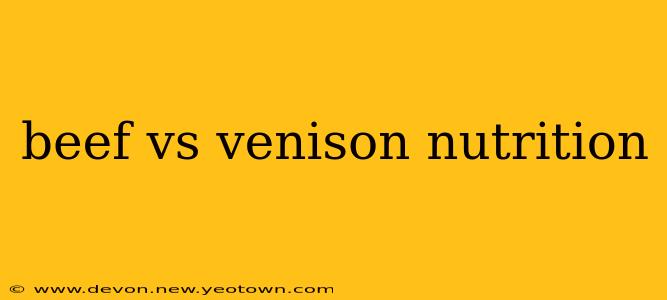The aroma of grilling meat, the satisfying chew, the rich flavor – whether it's beef or venison, there's something undeniably primal about enjoying a good cut of red meat. But beyond the culinary appeal, lies a significant difference in their nutritional profiles. This deep dive into beef vs. venison nutrition will help you make informed choices for your diet. Let's embark on a culinary and nutritional adventure, comparing these two popular protein sources.
What are the key nutritional differences between beef and venison?
This is often the first question that pops into people's minds. The truth is, both beef and venison are excellent sources of protein, essential for building and repairing tissues. However, the specifics differ. Venison generally boasts a leaner profile than beef, meaning it contains less total fat and fewer calories per serving. This doesn't automatically make it "healthier," but it does make it a suitable choice for those watching their calorie or fat intake. Beef, especially certain cuts, can be higher in saturated fat, which is something to consider for those with heart health concerns. We'll explore the specifics of fat content further down.
Is venison healthier than beef?
The "healthier" label depends entirely on individual dietary needs and preferences. While venison often comes out ahead in terms of fat and calorie content, it’s not inherently superior. Beef, especially grass-fed beef, can offer a wider array of micronutrients. The nutritional value of both meats also varies greatly depending on the animal's diet, age, and the specific cut of meat. A lean cut of beef might actually be nutritionally similar to a certain cut of venison. The key is understanding what nutrients are important to you and making choices accordingly.
How does the fat content compare between beef and venison?
Here's where the significant differences often become apparent. Venison is naturally leaner, generally containing less total fat and saturated fat than beef. This is largely due to the venison's diet – deer are primarily grazers, consuming vegetation with lower fat content than the grains often fed to cattle. However, the fat content can still vary depending on the deer's diet and the cut of meat. A very marbled cut of venison will still have more fat than a lean cut of beef.
What are the benefits of eating venison?
Many people choose venison for its leaner profile, lower calorie count, and the perceived "wild" aspect associated with its source. The lower fat content makes it a suitable option for individuals following weight-loss diets or those mindful of their cholesterol levels. Venison is also a rich source of iron and protein, contributing to muscle building and overall health. Its delicate flavour is another key selling point for many consumers.
What are the benefits of eating beef?
Beef, especially grass-fed beef, offers a wider range of nutrients, including certain vitamins and minerals not as abundant in venison. Grass-fed beef, in particular, often contains higher levels of conjugated linoleic acid (CLA), an omega-6 fatty acid with potential health benefits. Beef is also a great source of protein, zinc, and vitamin B12. The rich flavor and variety of cuts available make it a staple in countless cuisines around the world.
Is venison more expensive than beef?
The price difference can fluctuate depending on availability and location. Generally, venison tends to be more expensive than beef, primarily due to the differences in farming practices and demand. Venison is typically sourced from wild or sustainably managed herds, which increases the costs associated with sourcing, processing, and distribution compared to mass-produced beef.
This comprehensive comparison highlights the nuances of beef versus venison nutrition. The "better" choice hinges on your individual needs, dietary preferences, and budget. Both offer valuable nutritional contributions to a well-balanced diet, and the best choice ultimately comes down to personal preference and consideration of individual health goals.

